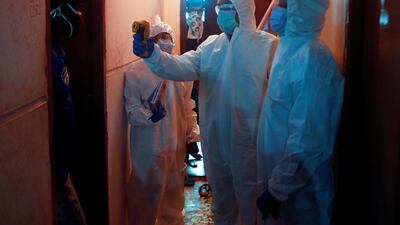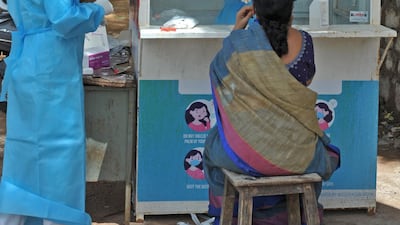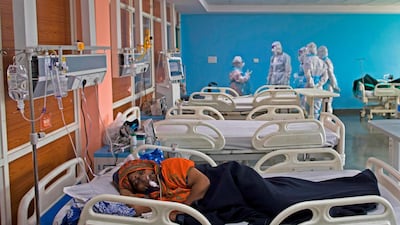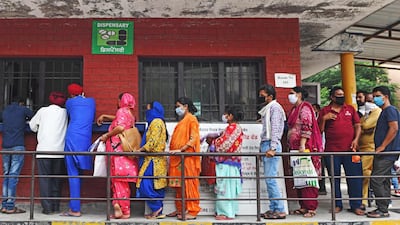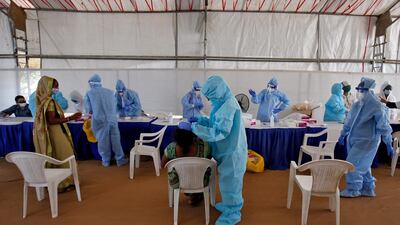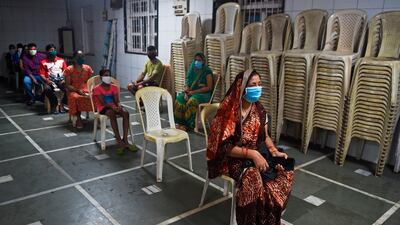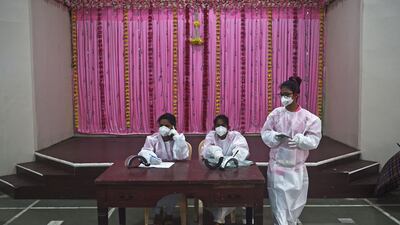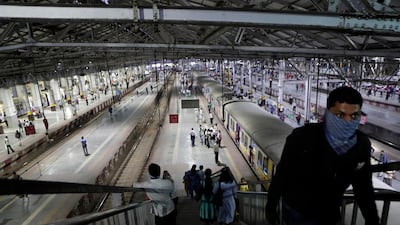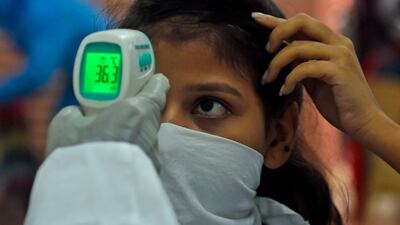In June, India began using cheaper, faster but less accurate tests to scale up its fight against the coronavirus, but scientists said it might be missing cases and leading to a spread of clusters.
The warnings came as India on Sunday passed 3 million cases of Covid-19 and the virus marches through impoverished rural areas in the north and the wealthier but older populations of the south.
Health authorities reported 10,339 more cases and 912 deaths, taking the total to 3,044,940. The number of new infections reported on Sunday marked a sharp decline from the previous 18 days, when India had reported more than 60,000 cases daily.
India has the third-highest caseload after the United States and Brazil, and its 56,706 fatalities are the fourth-highest in the world.
The rapid tests improved India’s screening levels nearly five-fold within two months. But government numbers suggested that some parts might have become over-reliant on the faster tests, which can miss infections. Scientists said that using them safely required frequent retesting, something that was not always taking place.
Cases surged faster than labs could increase testing once India’s strict lockdown was relaxed. So far, authorities have rationed the use of the more precise molecular tests that detect the genetic code of the virus. But on June 14, India decided to bolster these with faster kinds that screen for antigens, or viral proteins.
While less accurate, these tests are cheap and yield results in minutes. Most do not require a lab for processing or any specialised equipment or trained personnel. The plan was to rapidly increase testing to identify infected people and prevent them from spreading the virus. Use of both increased from 5.6 million in mid-June to 26 million two months later, and nearly a third of all tests conducted daily were now the antigen kind, health officials said.
But India’s experience also highlighted the inherent pitfalls of relying too heavily on antigen tests at the expense of the more accurate. The danger is that the tests may falsely clear many who are infected with Covid-19, contributing to spread of the virus.
Rapid test results can be augmented with more accurate laboratory procedures, but these are slower and expensive. Scientists said that since the two types vary in accuracy, they need to be interpreted separately to properly assess the spread of infection – something India is not doing.
The US faces a similar need to strike a balance between speed and precision, with laboratories struggling to keep pace with the outbreak. Researchers at Harvard University proposed developing a $1 saliva-based antigen test for all Americans to test themselves daily, which has not yet been approved by the Food and Drug Administration.
Harvard’s Dr Michael Mina said antigen tests do not catch as many patients early in the infection, when virus levels are low. But these people were not considered the greatest threat to spreading the disease because it is only after virus levels surge that they become more infectious, and by then they will be picked up by antigen tests, he said.
Because a negative antigen test does not guarantee a person is virus free, people should be called in regularly, said Dr Ashish Jha, director of Harvard’s Global Health Institute. “If their symptoms change, you want to think about retesting those people.”
India’s strategy is different. Health officials have asked for those who are found coronavirus negative with antigen tests but have symptoms to be reassessed with the more accurate laboratory tests.
But India has largely been opaque about how many negatives were retested, and what methods were used.
Delhi state, which includes the Indian capital of New Delhi, and where the High Court is monitoring testing, was among the first to aggressively use antigen tests to screen patients free of charge. Centres were created in dispensaries, schools and government offices. But only 0.5 per cent, or 1,365 of more than 260,000 people who were found to be negative from June 18 to July 29, were retested, court documents showed. Delhi conducted more than 280,000 tests in this period.
“That is abysmally low,” said Dr SP Kalantri, a public health specialist in Maharashtra, India’s worst-hit state. He said the decline in use of more precise lab tests by nearly half, from a capacity of 11,000 daily to 5,400 per day, was a worrying trend.
Under guidelines set by the World Health Organisation, India should be conducting around 140 daily tests per million people in order to safely relax coronavirus restrictions.
Rajesh Bhushan, India’s senior health official, has pointed to India’s cumulative total of the two types of test to assert that it is exceeding the WHO standard. Authorities also used this to calculate the percentage of samples proving positive, which is a key metric for judging performance.
But Dr Jha said combined data from the two types cannot be used to conclude that infections in India are going down, since using less accurate kinds would automatically drive down the number of positive results.
Scientists feared that over-reliance on antigen tests without retesting could impede efforts to contain the virus as it spreads to states with fragile health care systems, like Bihar and Uttar Pradesh, with a combined population of 300 million.
The two states now conduct about 100,000 tests daily, the most in India. But only a fraction – 6,100 in Bihar and 30,000 in Uttar Pradesh – use laboratory tests.
Dr Jha said the antigen tests were a way to expand the assessment of people who do not have access to laboratory tests, but that did not mean use of the more accurate version should decrease.
“I want both,” he said. The rapid test “isn’t a perfect substitute”.
The%20specs
%3Cp%3E%3Cstrong%3EEngine%3A%3C%2Fstrong%3E%202-litre%204-cylinder%3Cbr%3E%3Cstrong%3EPower%3A%20%3C%2Fstrong%3E153hp%20at%206%2C000rpm%3Cbr%3E%3Cstrong%3ETorque%3A%20%3C%2Fstrong%3E200Nm%20at%204%2C000rpm%3Cbr%3E%3Cstrong%3ETransmission%3A%20%3C%2Fstrong%3E6-speed%20auto%3Cbr%3E%3Cstrong%3EFuel%20consumption%3A%20%3C%2Fstrong%3E6.3L%2F100km%3Cbr%3E%3Cstrong%3EPrice%3A%20%3C%2Fstrong%3EDh106%2C900%3Cbr%3E%3Cstrong%3EOn%20sale%3A%20%3C%2Fstrong%3Enow%3C%2Fp%3E%0A
2019 Asian Cup final
Japan v Qatar
Friday, 6pm
Zayed Sports City Stadium, Abu Dhabi
Company%20profile
%3Cp%3E%3Cstrong%3EName%3A%20%3C%2Fstrong%3EPurpl%3C%2Fp%3E%0A%3Cp%3E%3Cstrong%3ECo-founders%3A%20%3C%2Fstrong%3EKarl%20Naim%2C%20Wissam%20Ghorra%2C%20Jean-Marie%20Khoueir%3C%2Fp%3E%0A%3Cp%3E%3Cstrong%3EBased%3A%20%3C%2Fstrong%3EHub71%20in%20Abu%20Dhabi%20and%20Beirut%3C%2Fp%3E%0A%3Cp%3E%3Cstrong%3EStarted%3A%20%3C%2Fstrong%3E2021%3C%2Fp%3E%0A%3Cp%3E%3Cstrong%3ENumber%20of%20employees%3A%20%3C%2Fstrong%3E12%3C%2Fp%3E%0A%3Cp%3E%3Cstrong%3ESector%3A%20%3C%2Fstrong%3EFinTech%3C%2Fp%3E%0A%3Cp%3E%3Cstrong%3EFunding%3A%20%3C%2Fstrong%3E%242%20million%26nbsp%3B%3C%2Fp%3E%0A
Lampedusa: Gateway to Europe
Pietro Bartolo and Lidia Tilotta
Quercus
The%20specs
%3Cp%3E%3Cstrong%3EEngine%3A%3C%2Fstrong%3E%201.8-litre%204-cyl%20turbo%0D%3Cbr%3E%3Cstrong%3EPower%3A%20%3C%2Fstrong%3E190hp%20at%205%2C200rpm%0D%3Cbr%3E%3Cstrong%3ETorque%3A%3C%2Fstrong%3E%20320Nm%20from%201%2C800-5%2C000rpm%0D%3Cbr%3E%3Cstrong%3ETransmission%3A%20%3C%2Fstrong%3ESeven-speed%20dual-clutch%20auto%0D%3Cbr%3E%3Cstrong%3EFuel%20consumption%3A%3C%2Fstrong%3E%206.7L%2F100km%0D%3Cbr%3E%3Cstrong%3EPrice%3A%3C%2Fstrong%3E%20From%20Dh111%2C195%0D%3Cbr%3E%3Cstrong%3EOn%20sale%3A%20%3C%2Fstrong%3ENow%3C%2Fp%3E%0A
Why are asylum seekers being housed in hotels?
The number of asylum applications in the UK has reached a new record high, driven by those illegally entering the country in small boats crossing the English Channel.
A total of 111,084 people applied for asylum in the UK in the year to June 2025, the highest number for any 12-month period since current records began in 2001.
Asylum seekers and their families can be housed in temporary accommodation while their claim is assessed.
The Home Office provides the accommodation, meaning asylum seekers cannot choose where they live.
When there is not enough housing, the Home Office can move people to hotels or large sites like former military bases.
Our legal columnist
Name: Yousef Al Bahar
Advocate at Al Bahar & Associate Advocates and Legal Consultants, established in 1994
Education: Mr Al Bahar was born in 1979 and graduated in 2008 from the Judicial Institute. He took after his father, who was one of the first Emirati lawyers
Terror attacks in Paris, November 13, 2015
- At 9.16pm, three suicide attackers killed one person outside the Atade de France during a foootball match between France and Germany
- At 9.25pm, three attackers opened fire on restaurants and cafes over 20 minutes, killing 39 people
- Shortly after 9.40pm, three other attackers launched a three-hour raid on the Bataclan, in which 1,500 people had gathered to watch a rock concert. In total, 90 people were killed
- Salah Abdeslam, the only survivor of the terrorists, did not directly participate in the attacks, thought to be due to a technical glitch in his suicide vest
- He fled to Belgium and was involved in attacks on Brussels in March 2016. He is serving a life sentence in France
The specs
Engine: 3.0-litre six-cylinder MHEV
Power: 360bhp
Torque: 500Nm
Transmission: eight-speed automatic
Price: from Dh282,870
On sale: now
Ferrari
%3Cp%3E%3Cstrong%3EDirector%3A%3C%2Fstrong%3E%20Michael%20Mann%26nbsp%3B%3C%2Fp%3E%0A%3Cp%3E%3Cstrong%3EStarring%3A%3C%2Fstrong%3E%20Adam%20Driver%2C%20Penelope%20Cruz%2C%20Shailene%20Woodley%2C%20Patrick%20Dempsey%3C%2Fp%3E%0A%3Cp%3E%3Cstrong%3ERating%3A%3C%2Fstrong%3E%203%2F5%3C%2Fp%3E%0A
%3Cp%3E%3Cstrong%3EDirector%3A%3C%2Fstrong%3E%20Nag%20Ashwin%3C%2Fp%3E%0A%3Cp%3E%3Cstrong%3EStarring%3A%20%3C%2Fstrong%3EPrabhas%2C%20Saswata%20Chatterjee%2C%20Deepika%20Padukone%2C%20Amitabh%20Bachchan%2C%20Shobhana%3C%2Fp%3E%0A%3Cp%3E%3Cstrong%3ERating%3A%20%3C%2Fstrong%3E%E2%98%85%E2%98%85%E2%98%85%E2%98%85%3C%2Fp%3E%0A
Tips for taking the metro
- set out well ahead of time
- make sure you have at least Dh15 on you Nol card, as there could be big queues for top-up machines
- enter the right cabin. The train may be too busy to move between carriages once you're on
- don't carry too much luggage and tuck it under a seat to make room for fellow passengers
The Lowdown
Us
Director: Jordan Peele
Starring: Lupita Nyong'o, Winston Duke, Shahadi Wright Joseqph, Evan Alex and Elisabeth Moss
Rating: 4/5
The%20specs
%3Cp%3E%3Cstrong%3EPowertrain%3A%20%3C%2Fstrong%3ESingle%20electric%20motor%0D%3Cbr%3E%3Cstrong%3EPower%3A%20%3C%2Fstrong%3E201hp%0D%3Cbr%3E%3Cstrong%3ETorque%3A%20%3C%2Fstrong%3E310Nm%0D%3Cbr%3E%3Cstrong%3ETransmission%3A%20%3C%2Fstrong%3ESingle-speed%20auto%0D%3Cbr%3E%3Cstrong%3EBattery%3A%20%3C%2Fstrong%3E53kWh%20lithium-ion%20battery%20pack%20(GS%20base%20model)%3B%2070kWh%20battery%20pack%20(GF)%0D%3Cbr%3E%3Cstrong%3ETouring%20range%3A%20%3C%2Fstrong%3E350km%20(GS)%3B%20480km%20(GF)%0D%3Cbr%3E%3Cstrong%3EPrice%3A%20%3C%2Fstrong%3EFrom%20Dh129%2C900%20(GS)%3B%20Dh149%2C000%20(GF)%0D%3Cbr%3E%3Cstrong%3EOn%20sale%3A%3C%2Fstrong%3E%20Now%3C%2Fp%3E%0A
The Bio
Favourite Emirati dish: I have so many because it has a lot of herbs and vegetables. Harees (oats with chicken) is one of them
Favourite place to go to: Dubai Mall because it has lots of sports shops.
Her motivation: My performance because I know that whatever I do, if I put the effort in, I’ll get results
During her free time: I like to drink coffee - a latte no sugar and no flavours. I do not like cold drinks
Pet peeve: That with every meal they give you a fries and Pepsi. That is so unhealthy
Advice to anyone who wants to be an ironman: Go for the goal. If you are consistent, you will get there. With the first one, it might not be what they want but they should start and just do it
Another way to earn air miles
In addition to the Emirates and Etihad programmes, there is the Air Miles Middle East card, which offers members the ability to choose any airline, has no black-out dates and no restrictions on seat availability. Air Miles is linked up to HSBC credit cards and can also be earned through retail partners such as Spinneys, Sharaf DG and The Toy Store.
An Emirates Dubai-London round-trip ticket costs 180,000 miles on the Air Miles website. But customers earn these ‘miles’ at a much faster rate than airline miles. Adidas offers two air miles per Dh1 spent. Air Miles has partnerships with websites as well, so booking.com and agoda.com offer three miles per Dh1 spent.
“If you use your HSBC credit card when shopping at our partners, you are able to earn Air Miles twice which will mean you can get that flight reward faster and for less spend,” says Paul Lacey, the managing director for Europe, Middle East and India for Aimia, which owns and operates Air Miles Middle East.
ON%20TRACK
%3Cp%3EThe%20Dubai%20Metaverse%20Assembly%20will%20host%20three%20main%20tracks%3A%3C%2Fp%3E%0A%3Cp%3E%3Cstrong%3EEducate%3A%3C%2Fstrong%3E%20Consists%20of%20more%20than%2010%20in-depth%20sessions%20on%20the%20metaverse%3C%2Fp%3E%0A%3Cp%3E%3Cstrong%3EInspire%3A%3C%2Fstrong%3E%20Will%20showcase%20use%20cases%20of%20the%20metaverse%20in%20tourism%2C%20logistics%2C%20retail%2C%20education%20and%20health%20care%3C%2Fp%3E%0A%3Cp%3E%3Cstrong%3EContribute%3A%3C%2Fstrong%3E%20Workshops%20for%20metaverse%20foresight%20and%20use-case%20reviews%3C%2Fp%3E%0A
Queen
Nicki Minaj
(Young Money/Cash Money)
COMPANY PROFILE
Initial investment: Undisclosed
Investment stage: Series A
Investors: Core42
Current number of staff: 47
Killing of Qassem Suleimani
Race%20card
%3Cp%3E6pm%3A%20Al%20Maktoum%20Challenge%20Round%201%20%E2%80%93%20Group%201%20(PA)%20%2450%2C000%20(Dirt)%201%2C600m%3Cbr%3E6.35pm%3A%20Dubai%20Racing%20Club%20Classic%20%E2%80%93%20Handicap%20(TB)%20%24100%2C000%20(D)%202%2C410m%3Cbr%3E7.10pm%3A%20Dubawi%20Stakes%20%E2%80%93%20Group%203%20(TB)%20%24150%2C000%20(D)%201%2C200m%3Cbr%3E7.45pm%3A%20Jumeirah%20Classic%20Trial%20%E2%80%93%20Conditions%20(TB)%20%24150%2C000%20(Turf)%201%2C400m%3Cbr%3E8.20pm%3A%20Al%20Maktoum%20Challenge%20Round%201%20%E2%80%93%20Group%202%20(TB)%20%24250%2C000%20(D)%201%2C600m%3Cbr%3E8.55pm%3A%20Al%20Fahidi%20Fort%20%E2%80%93%20Group%202%20(TB)%20%24180%2C000%20(T)%201%2C400m%3Cbr%3E9.30pm%3A%20Ertijaal%20Dubai%20Dash%20%E2%80%93%20Listed%20(TB)%20%24100%2C000%20(T)%201%2C000m%3C%2Fp%3E%0A
What's%20in%20my%20pazhamkootan%3F
%3Cp%3E%3Cstrong%3EAdd%3A%3C%2Fstrong%3E%3Cbr%3EParippu%20%E2%80%93%20moong%20dal%20and%20coconut%20curry%3Cbr%3ESambar%20%E2%80%93%20vegetable-infused%20toor%20dal%20curry%3Cbr%3EAviyal%20%E2%80%93%20mixed%20vegetables%20in%20thick%20coconut%20paste%3Cbr%3EThoran%20%E2%80%93%20beans%20and%20other%20dry%20veggies%20with%20spiced%20coconut%3Cbr%3EKhichdi%20%E2%80%93%20lentil%20and%20rice%20porridge%3C%2Fp%3E%0A%3Cp%3E%3Cbr%3E%3Cstrong%3EOptional%3A%3C%2Fstrong%3E%3Cbr%3EKootukari%20%E2%80%93%20stew%20of%20black%20chickpeas%2C%20raw%20banana%2C%20yam%20and%20coconut%20paste%3Cbr%3EOlan%20%E2%80%93%20ash%20gourd%20curry%20with%20coconut%20milk%3Cbr%3EPulissery%20%E2%80%93%20spiced%20buttermilk%20curry%3Cbr%3ERasam%20%E2%80%93%20spice-infused%20soup%20with%20a%20tamarind%20base%3C%2Fp%3E%0A%3Cp%3E%3Cbr%3E%3Cstrong%3EAvoid%3A%3C%2Fstrong%3E%3Cbr%3EPayasam%20%E2%80%93%20sweet%20vermicelli%20kheer%3C%2Fp%3E%0A
Inside%20Out%202
%3Cp%3E%3Cstrong%3EDirector%3A%C2%A0%3C%2Fstrong%3EKelsey%20Mann%3C%2Fp%3E%0A%3Cp%3E%3Cstrong%3EStarring%3A%3C%2Fstrong%3E%C2%A0Amy%20Poehler%2C%20Maya%20Hawke%2C%20Ayo%20Edebiri%3C%2Fp%3E%0A%3Cp%3E%3Cstrong%3ERating%3A%20%3C%2Fstrong%3E4.5%2F5%3C%2Fp%3E%0A
Zayed Sustainability Prize
COMPANY%20PROFILE
%3Cp%3E%3Cstrong%3EName%3A%20%3C%2Fstrong%3ESmartCrowd%0D%3Cbr%3E%3Cstrong%3EStarted%3A%20%3C%2Fstrong%3E2018%0D%3Cbr%3E%3Cstrong%3EFounder%3A%20%3C%2Fstrong%3ESiddiq%20Farid%20and%20Musfique%20Ahmed%0D%3Cbr%3E%3Cstrong%3EBased%3A%20%3C%2Fstrong%3EDubai%0D%3Cbr%3E%3Cstrong%3ESector%3A%20%3C%2Fstrong%3EFinTech%20%2F%20PropTech%0D%3Cbr%3E%3Cstrong%3EInitial%20investment%3A%20%3C%2Fstrong%3E%24650%2C000%0D%3Cbr%3E%3Cstrong%3ECurrent%20number%20of%20staff%3A%3C%2Fstrong%3E%2035%0D%3Cbr%3E%3Cstrong%3EInvestment%20stage%3A%20%3C%2Fstrong%3ESeries%20A%0D%3Cbr%3E%3Cstrong%3EInvestors%3A%20%3C%2Fstrong%3EVarious%20institutional%20investors%20and%20notable%20angel%20investors%20(500%20MENA%2C%20Shurooq%2C%20Mada%2C%20Seedstar%2C%20Tricap)%3C%2Fp%3E%0A
Scores
Bournemouth 0-4 Liverpool
Arsenal 1-0 Huddersfield Town
Burnley 1-0 Brighton
Manchester United 4-1 Fulham
West Ham 3-2 Crystal Palace
Saturday fixtures:
Chelsea v Manchester City, 9.30pm (UAE)
Leicester City v Tottenham Hotspur, 11.45pm (UAE)
Skoda Superb Specs
Engine: 2-litre TSI petrol
Power: 190hp
Torque: 320Nm
Price: From Dh147,000
Available: Now
Result:
1. Cecilie Hatteland (NOR) atop Alex - 31.46 seconds
2. Anna Gorbacheva (RUS) atop Curt 13 - 31.82 seconds
3. Georgia Tame (GBR) atop Cash Up - 32.81 seconds
4. Sheikha Latifa bint Ahmed Al Maktoum (UAE) atop Peanuts de Beaufour - 35.85 seconds
5. Miriam Schneider (GER) atop Benur du Romet - 37.53 seconds
6. Annika Sande (NOR) atop For Cash 2 - 31.42 seconds (4 penalties)
A cryptocurrency primer for beginners
Cryptocurrency Investing for Dummies – by Kiana Danial
There are several primers for investing in cryptocurrencies available online, including e-books written by people whose credentials fall apart on the second page of your preferred search engine.
Ms Danial is a finance coach and former currency analyst who writes for Nasdaq. Her broad-strokes primer (2019) breaks down investing in cryptocurrency into baby steps, while explaining the terms and technologies involved.
Although cryptocurrencies are a fast evolving world, this book offers a good insight into the game as well as providing some basic tips, strategies and warning signs.
Begin your cryptocurrency journey here.
Available at Magrudy’s , Dh104
Benefits of first-time home buyers' scheme
- Priority access to new homes from participating developers
- Discounts on sales price of off-plan units
- Flexible payment plans from developers
- Mortgages with better interest rates, faster approval times and reduced fees
- DLD registration fee can be paid through banks or credit cards at zero interest rates
Profile of RentSher
Started: October 2015 in India, November 2016 in UAE
Founders: Harsh Dhand; Vaibhav and Purvashi Doshi
Based: Bangalore, India and Dubai, UAE
Sector: Online rental marketplace
Size: 40 employees
Investment: $2 million













